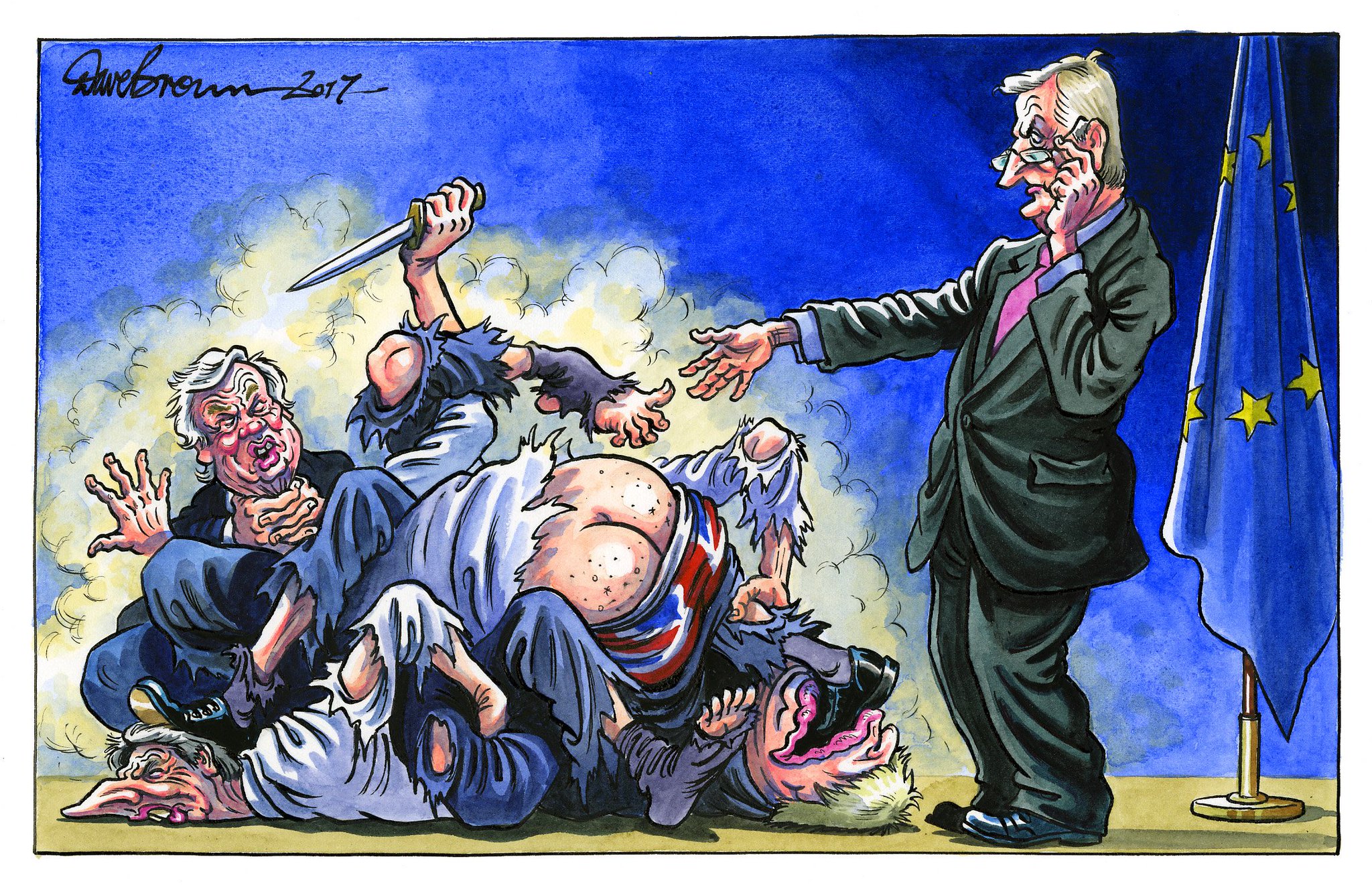
EP. WESTERN CIVILIZATION - "INGLORIOUS BASTARDS"
Starting 15 years ago my work on the study of the causes of the infamous phenomenon of Russophobia in the West, I was struck by its cruelty and uncompromising hostility of the "West" to Russia, regardless of time and geopolitical situation.
However, in process of delving into the stream of history of the Western Europe, it turned out that the authorities of the Western European states were no less cruel and uncompromising in relations to their own peoples and to all countries, held hostile.
The history of centuries of wars between the countries of Europe is striking with all the cruelty, the insolubility of contradictions between them (which still exist) and a special vindictiveness at the next victory of one side or another, which changed with a certain periodicity.
Contempt for the people of the "enemy"-country of the moment was expressed in the stable nicknames for entire nations - "macaroni" (Italy), "frogs breeders or eaters" (France), "beer barrels", "pigs", "sausage makers" (Germany), and what is especially striking, all these names had nothing to do with the character of the peoples, but only fixed on the food preferences or the shallow characteristics of one or another ethnic group of Western Europe.
But even more striking was the scale of casualties and losses in every war or internal repression and the insignificance of the reasons for which these wars were unleashed or repressions began.
And the reason (or suggested reasons) for wars or repressions were religious differences (very minor), territorial claims (wars of succession for thrones), ethnic regional or internal strife, and revolt - PEOPLE'S DISSATISFACTION WITH THE EXISTING ORDER OR THEIR OWN POVERTY AND HUNGER.
These latter - riots and revolutions - were suppressed with particular cruelty. The atrocities during the riots and revolutions were not different from the "softness of the attitude" towards the enemy.
Representatives of the aristocracy (according to English researchers) were always concerned about the particular mood of the moment of the mass of the people and the hostility of this mass to the elites. And as a primary task for elites of all times, the control and punishment of the lower strata (the majority) has always been a main priority.
Especially striking for us are the public executions with mass gathering of people, which had become a traditional entertainment for the European rabble.
European elites - refined, educated, polite in habits and manners - tough and cold in practice of reality - indulged in cruelty in political games on the international and domestic arena or in their own legislation and personal life.
The colonial policy of all European countries, that had the opportunity to explore and conquer something, or just build a couple of ships, was distinguished by the same cruelty, but already in relation to aborigines or competitors on the sea.
And we thought that this was the particular cruelty of some sea robbers - we were mistaken - this was the cruelty of the Britons, elevated into a principle and dogma, as a distinctive feature of an exceptional "colonial race". And they were copied all over Europe. (In particular, in Germany.)
Historically, the entire formation of the post-Roman states in Europe is characterized only by constant wars, the habit of violence and terrible cruelty in everything, including ordinary life: raising children, attitude to women and servants, relationship between people and ruling elites.
All this was covered up by "law, traditions and order", as in Britain, where after peasants had been driven off the land, they were brought to trial, sentenced and then executed for vagrancy - from 60,000 to 100,000 executed. Or some 70,000 victims during the week of "St. Bartholomew's Nights" (the Chrystal nights).
The same Britons who hypocritically resented the "horrors of the Soviet Gulag" and the use of forced labor (and what else can there be in prison?) of prisoners in the USSR, became famous for the creation of their own "gulags" = "the workhouses" for convicts, beggars and those who lost their livelihoods back in the 17th century and further on. And they were famous for the particularly cruel use of child labor.
Workhouse, Disciplinary House (Dutch tuchthuis) — penitentiary and/or charitable institutions, aimed at isolating and/or forcing/stimulating the needy, petty criminals and beggars to work. Last resort for the poorest = kind of a social shelter for those, who had lost hope. A very cruel and merciless shelter.
The first workhouse appeared in 1652, and by the XIX century they were built in almost every large parish or association of parishes[1].
Forced workhouses were often combined with prisons, and voluntary ones with almshouses, shelters and educational institutions.
Initially, workhouses were aimed at reducing the financial costs of maintaining prisoners, assuming that they could not only be self-supporting, but also profitable, profitable. ...
Workhouses were created by both state authorities and private individuals. Their financing was carried out at the expense of the treasury and/or donations.
Due to the development of social security systems in the XX century, the system of workhouses has largely lost its relevance. The last workhouse in the UK was closed in 1941.[1] However, they still exist in a different form. (By the way, they also exist in Finland as social institutions. EP.)
At the end of the XX — beginning of the XXI century, institutions similar to voluntary workhouses began to be attributed to one of the forms of social entrepreneurship. (Wiki.rus)
In order to understand the inhumanity of such institutions for people, who have not committed crimes, and for children of all ages, it is enough to read Dickens. Very enlightening.
The situation in the mentality of the Western Europeans was reversed (a little, not entirely) by a series of wars of the 20th century, when wars were waged on the territory of Europe and the population of Europe suffered from their terrible consequences.
The first to join the political life of the Western Europe were pacifists - opponents of war. From there, theories of humanism and the primacy of the meaning of human life in politics and economics were brought to light again and developed. However, in reality they turned out to be dummy simulacra, like European social democracy. But the slogan has been used over and over again, for instance, the "flower children" (the hippies) of the 60s were pacifists.
It is only necessary not to forget that the Soviet Russia, having succeeded to break away from the First World War through the separate Brest Peace for economic and political reasons, and having dealt with its own civil war and the intervention of the notorious "friends-partners-allies", laid the foundation for a systematic struggle for world peace.
But itself got attacked by the fascist Germany and its European allies - all European countries except the British and Americans (and only situationally, they "tacticated" for a long time, choosing, whom to support in order to weaken both). Russia withstood this war and won.
The war for the Red Army ended in Berlin with the division of spheres of influence between the USSR and the "allies" - Britain and the United States, who had appeared there (opening the "second front") just in time (at the end of 1944). France, which surrended to Germany and lost in general, was dragged in there too, just to snatch a larger "piece of pie" from Russia in Europe.
However, all these ideas - social justice and respect for the personality of an individual and his life - which was impossible not to accept after the end of the World War II, were artfully distorted and manipulated by the ruling elites, for whom war was and remains a habitual modus operandi = "way of doing things" - one of the tools in politics, geopolitical, trade and financial games.
And all the recent history of the West and the world as a whole is proof of this. A huge role in this was played by the US loans for post-war reconstruction (the "Marshall Plan"), the condition for obtaining which was the removal of communists from their governments.
So, Western civilization can really be called a civilization of murder, which only at the end of the 20th century tried to abandon the cruel matrix of operating in the world through wars and coercion by violence, but failed.
And notice the "cultural products", that the entire Western world (including, unfortunately, Russia) still consumes - these are crime detectives and action films, where the action is violence, meanness, betrayal, fraud, blackmail, murder and war (even if it is a war of one person). These films foster a criminal mindset and teach violence, or at least tolerance to violence. "Well, that's life...", they say, and so it is, thanks to them.
Everything is as before - as always.
And it provides a normal, at least, or even a positive impression of these "works", equipped with high-quality shooting, rich or exotic surroundings and beautiful classical or other music.
And these are the well-known works of Bulwer-Lytton, A. Conan Doyle, Agatha Christie and a whole galaxy of modern American writers...
But after getting acquainted with the research on the topic of British elites or British fascism (racism-Nazism), the hair stands on end, and you no longer want to read or watch your earlier favorite books and TV series.
For those who want to get seriously acquainted with the real history of Great Britain (and the West), I recommend the study of Manuel Sarkisyants.
Manuel Sarkisyants
THE ENGLISH ROOTS OF GERMAN FASCISM: from the British to the Austro-Bavarian "master race"
EP.
ЕП. ЗАПАДНАЯ ЦИВИЛИЗАЦИЯ - "БЕССЛАВНЫЕ УБЛЮДКИ"
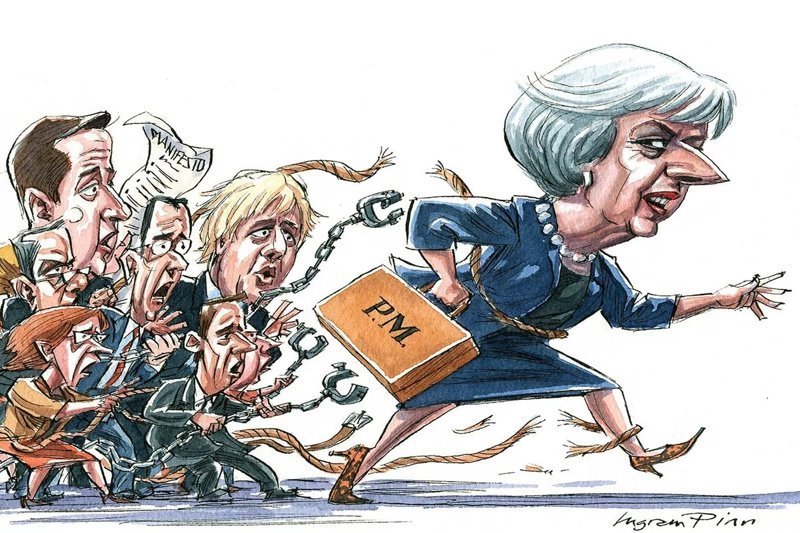


ЕП. ЗАПАДНАЯ ЦИВИЛИЗАЦИЯ - "БЕССЛАВНЫЕ УБЛЮДКИ"
Начиная лет 15 тому назад свою работу по исследованию причин русофобии на западе, я была поражена жестокостью и бескомпромиссностью враждебного отношения "запада" к России независимо от времени и геополитической ситуации.
Однако, при углублении в историю западной Европы выяснилось, что власти западно-европейских государств были не менее жестоки и бескомпромиссны и по отношению к собственным народам и к странам-врагам.
История войн между странами Европы поражает все той жестокостью, неразрешимостью противоречий (существующих до сих пор) и особой мстительностью при очередной победе той или иной стороны, которые с определенной периодичностью менялись.
Презрение к народу страны-"врага" в данный момент выражалось в устойчивых наименованиях-прозвищах целых народов - "макаронники" (Италия), "лягушатники" (Франция), "пивные бочонки", "свиньи", "колбасники" (Германия), и что особенно поражает, все эти названия не имели никакого отношения к характеру народов, а лишь фиксировали пищевые предпочтения или особенности того или иного этноса западной Европы.
Но еще больше поражали масштабы жертв и потерь при любой войне или внутренней репрессии и ничтожность поводов, по которым развязывались эти войны или начинались репрессии.
А причиной (или поводом) к войнам или репрессиям предлагались религиозные различия (очень незначительные), территориальные претензии (войны наследования за троны), этнические региональные или внутренние распри, и НЕДОВОЛЬСТВО НАРОДА СУЩЕСТВУЮЩИМИ ПОРЯДКАМИ ИЛИ СОБСТВЕННОЙ НИЩЕТОЙ И ГОЛОДОМ.
Эти последние - бунты и революции - подавлялись с особой жестокостью. Зверства во время бунтов и революций мягкостью отношения к врагу ничем не отличались. Представители аристократии (по сведениям английских исследователей) были озабочены настроениями массы народа и враждебностью этой массы к элитам. И в качестве первостепенной задачи ставили перед собой контроль и наказание низших слоев. Особенно поражают публичные казни при массовом скоплении народа, ставшие традиционным развлечением для европейской черни.

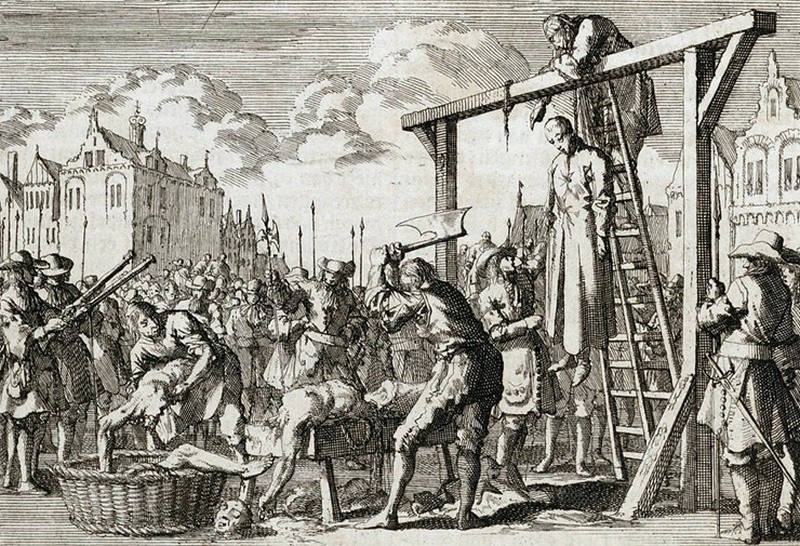
Европейские элиты - утонченные, образованные, изысканные в привычках и манерах - жесткие и холодные на деле - "отрывались" в жестокости в политических играх на международной и внутренней арене или в собственном законодательстве и личной жизни.
Колониальная политика всех европейских стран, у которых была возможность что-то исследовать и завоевывать, или просто построить пару кораблей, отличалась все той же жестокостью, но уже по отношению к аборигенам или конкурентам на морских просторах. И мы думали, что это - жестокость морских разбойников - мы ошибались - это жестокость англичан, возведенная в принцип и догму, как отличительная черта исключительной "колониальной расы". А их копировали по всей Европе. (В частности, в Германии.)
Исторически все становление пост-римских государственных образований в Европе характеризируется только постоянными войнами, привычкой к насилию и страшной жестокостью во всем, включая обычную жизнь: воспитание детей, отношение к женщинам и обслуге, взаимоотношения народа и правящих элит.
Все это прикрывалось "законом, традициями и порядком", как в Британии, где после огораживания выгнанных с земли крестьян судили, а потом и казнили за бродяжничество - от 60 000 до 100 000 казненных. Или 70 000 пострадавших за неделю "Варфоломеевских ночей".



Те же британцы, лицемерно возмущавшиеся "ужасами ГУЛАГа" и использованием принудительного (а какой еще может быть труд в тюрьме?) труда заключенных в СССР прославились созданием еще в 17-м веке собственных "работных домов" для осужденных, нищих и потерявших средства к существованию. И славились они особо жестоким использованием детского труда.
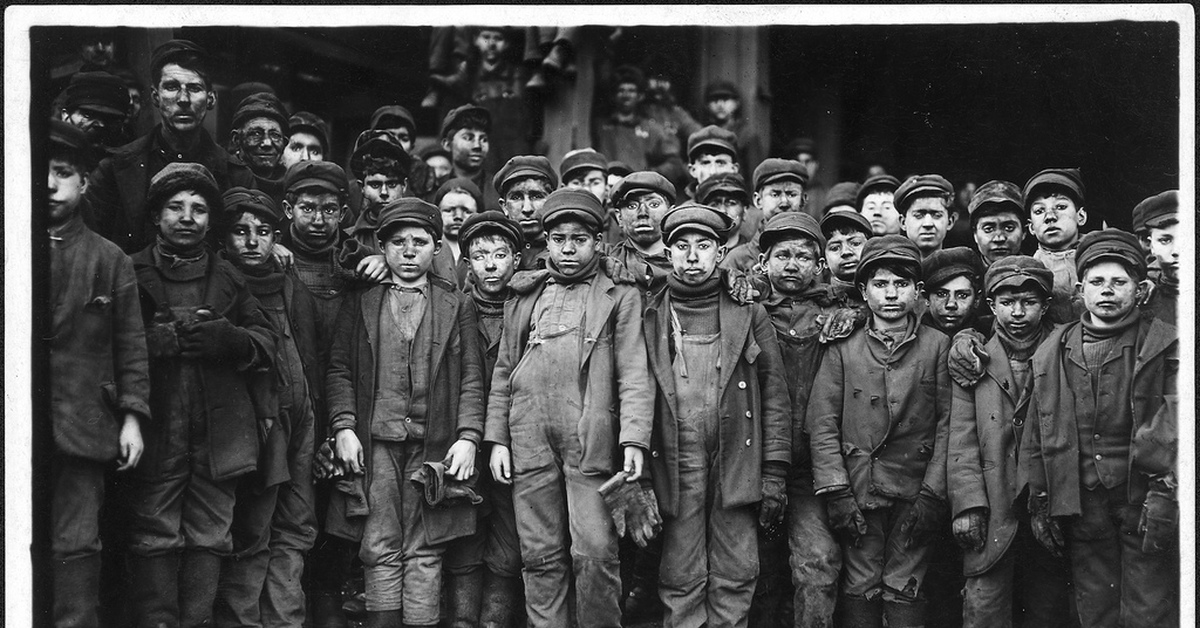
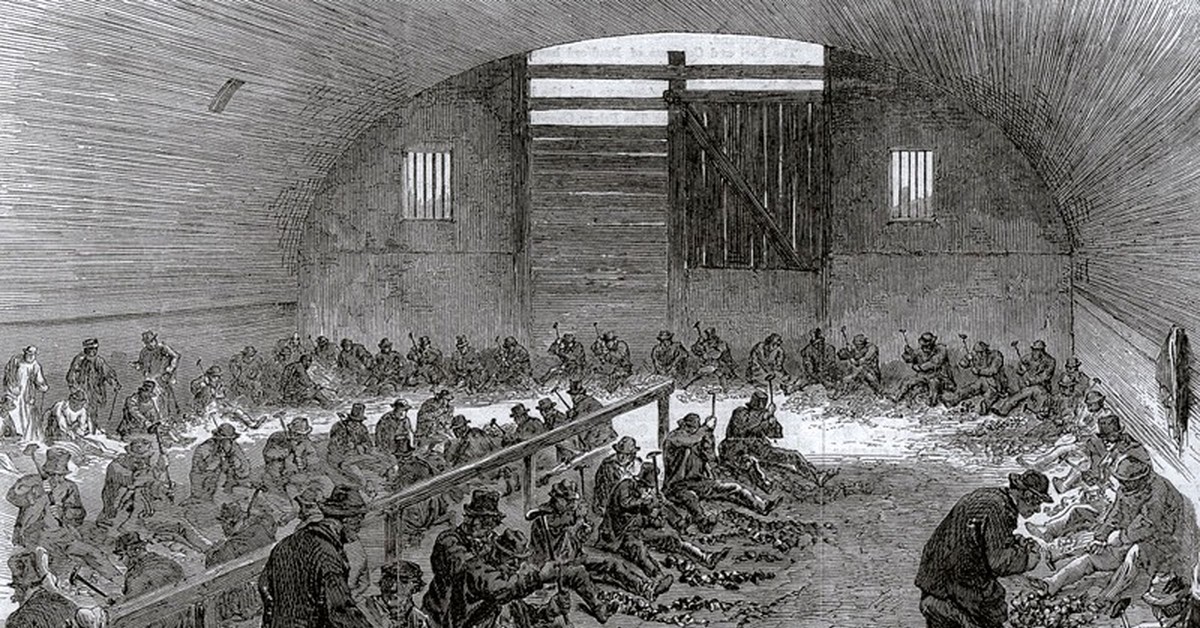
Работный (рабочий) дом (англ. workhouse), Дисциплинарный дом (нидерл. tuchthuis) — пенитенциарные и/или благотворительные учреждения, направленные на изоляцию и/или принуждение/стимуляцию к труду нуждающихся, мелких преступников и нищих.
Первый работный дом появился в 1652-м году, а к XIX веку их строили почти в каждом большом приходе или объединении приходов[1].
Принудительные работные дома зачастую совмещались с тюрьмами, а добровольные с богадельнями, приютами, образовательными и просветительскими учреждениями.
Изначально работные дома были нацелены на снижение финансовых затрат на содержание заключённых, предполагая, что они могут быть не только самоокупаемыми, но и рентабельными, приносящими прибыль. ...
Работные дома создавались как государственной властью так и частными лицами. Их финансирование велось за счёт казны и/или пожертвований.
В связи с развитием социального обеспечения в XX веке система работных домов в значительной степени утратила актуальность. Последний работный дом в Великобритании был закрыт в 1941 году[1]. Однако, они существуют до сих пор в другой форме. (Кстати, они существуют и в Финляндии, как социальные учреждения. ЕП.)
В конце XX — начале XXI века аналогичные добровольным работным домам учреждения стали относить к одной из форм социального предпринимательства. (Вики.рус)
Для того, чтобы понять бесчеловечность подобных заведений для людей, не совершивших преступлений, и для детей всех возрастов, достаточно почитать Диккенса. Очень просвещает.
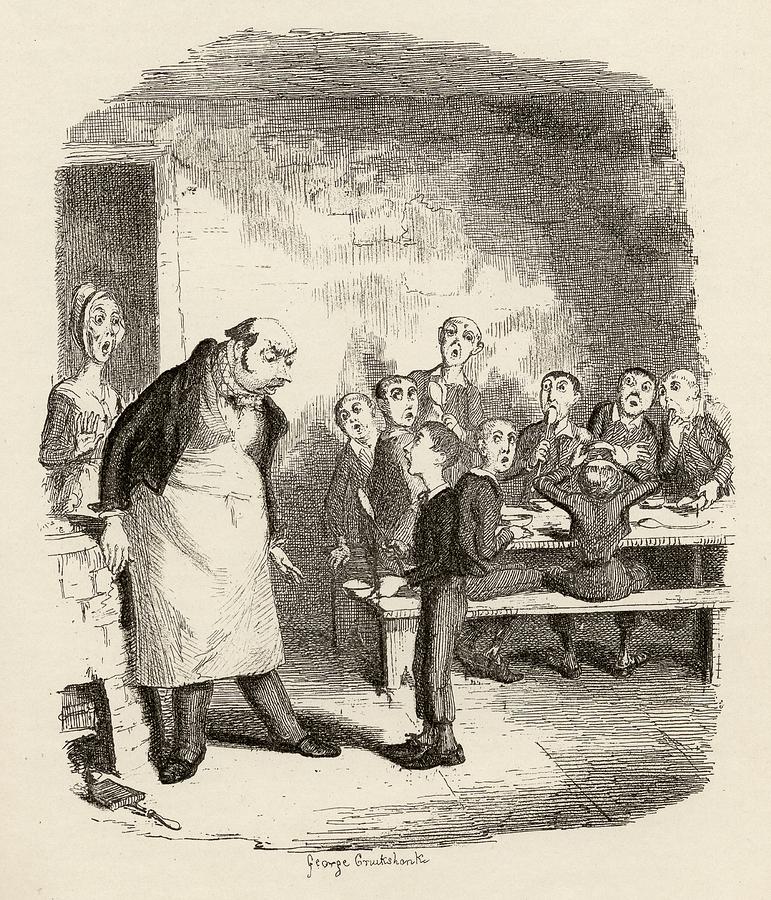
Переломила ситуацию в менталитете западных европейцев (немного, не целиком) череда войн 20-го века, когда войны велись на территории Европы и население Европы страдало от их последствий.
Первыми включились в политическую жизнь западной Европы пацифисты - противники войны. Оттуда развились теории гуманизма и первичности значения человеческой жизни в политике и экономике. Однако, на деле они оказались пустышками - муляжами - симулякрами, как и европейская социал-демократия. Затем, пацифистами были и "дети цветов" 60-х.
Нужно только не забывать о том, что Советская Россия, выйдя через сепаратный Брестский мир из Первой мировой войны по экономическим и политическим причинам, и разобравшись с собственной гражданской войной и интервенцией "друзей-партнеров", положила начало систематической борьбе за мир во всем мире.
А получила - нападение на себя фашистской Германии и ее европейских союзников - всех европейских стран, кроме британцев и американцев (и то ситуативно, они долго размышляли, кого поддерживать). Россия в этой войне выстояла и победила. 
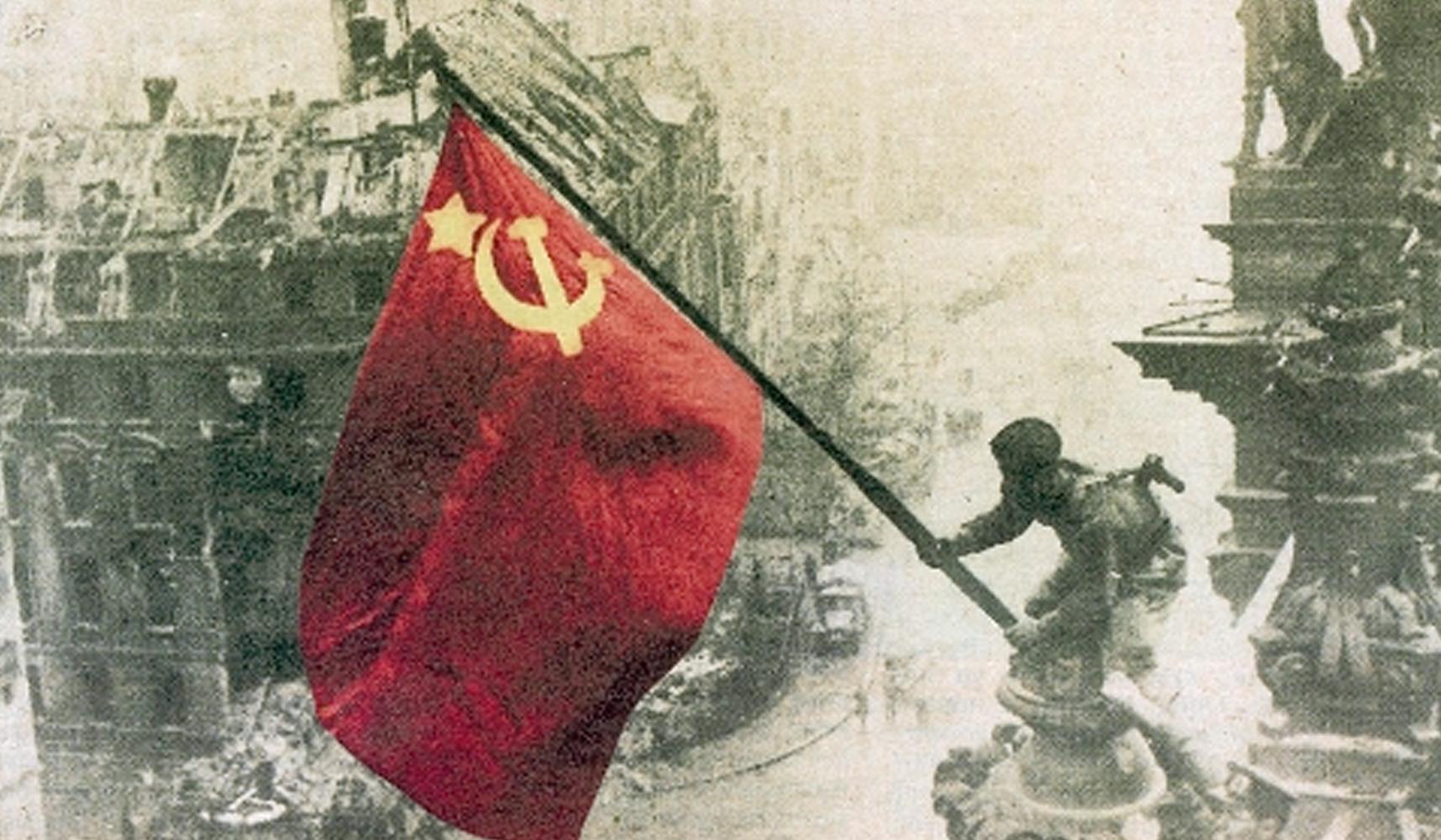
Война для Красной Армии закончилась в Берлине разделом сфер влияний между СССР и подсуетившимися вовремя (в конце 1944 г.) "союзниками" - Британией и США. Туда же втащили вообще проигравшую Францию, чтобы только урвать в Европе побольше от России.
Однако, все эти идеи - социальной справедливости и уважения к личности отдельного человека и его жизни - которые невозможно было не принять после окончания Второй Мировой войны, искусно извращались и коверкались правящими элитами, для которых война была и остается привычным "образом действий" - одним из инструментов в геополитических, торговых и финансовых играх. И тому доказательством вся новейшая история и запада и мира в целом. Огромную роль в этом сыграли кредиты США на послевоенное восстановление ("план Маршалла"), условием для получения которых было удаление коммунистов из правительств.
Так что, западную цивилизацию действительно можно назвать цивилизацией убийства, которая только в конце 20-го века попыталась отказаться от жестокой матрицы оперирования в мире через войны и принуждение насилием, но не смогла.
И обратите внимание на "культурную продукцию", которую весь западный мир (включая, к сожалению и Россию), потребляет до сих пор - это криминальные детективы и фильмы-действия, где действие - это насилие, подлость, предательство, мошенничество, шантаж, убийства и война (даже если это война одного человека). Эти фильмы воспитывают криминальный склад ума и приучают к насилию, хотя бы к толерантности к насилию. Ну, это же жизнь...
Все, как и прежде - как всегда.
И обеспечивается нормальное, по крайней мере, или даже положительное впечатление от этих "произведений", снабженных высоким качеством съемки, богатым или экзотичным антуражем и прекрасной классической музыкой.
И это всем нам хорошо известные произведения Булвер-Литтона, А. Конан Дойла, Агаты Кристи и целой плеяды современных американских писателей..
А вот после знакомства с исследованиями по теме британских элит или британского фашизма (расизма-нацизма) волосы встают дыбом, а читать или смотреть любимые раньше книги и сериалы уже не хочется.
Для тех, кто хочет серьезно познакомиться с настоящей историей Великобритании, рекомендую исследование Мануэля Саркисянца.
Мануэль Саркисянц
АНГЛИЙСКИЕ КОРНИ НЕМЕЦКОГО ФАШИЗМА: от британской к австро-баварской «расе господ»
ЕП.
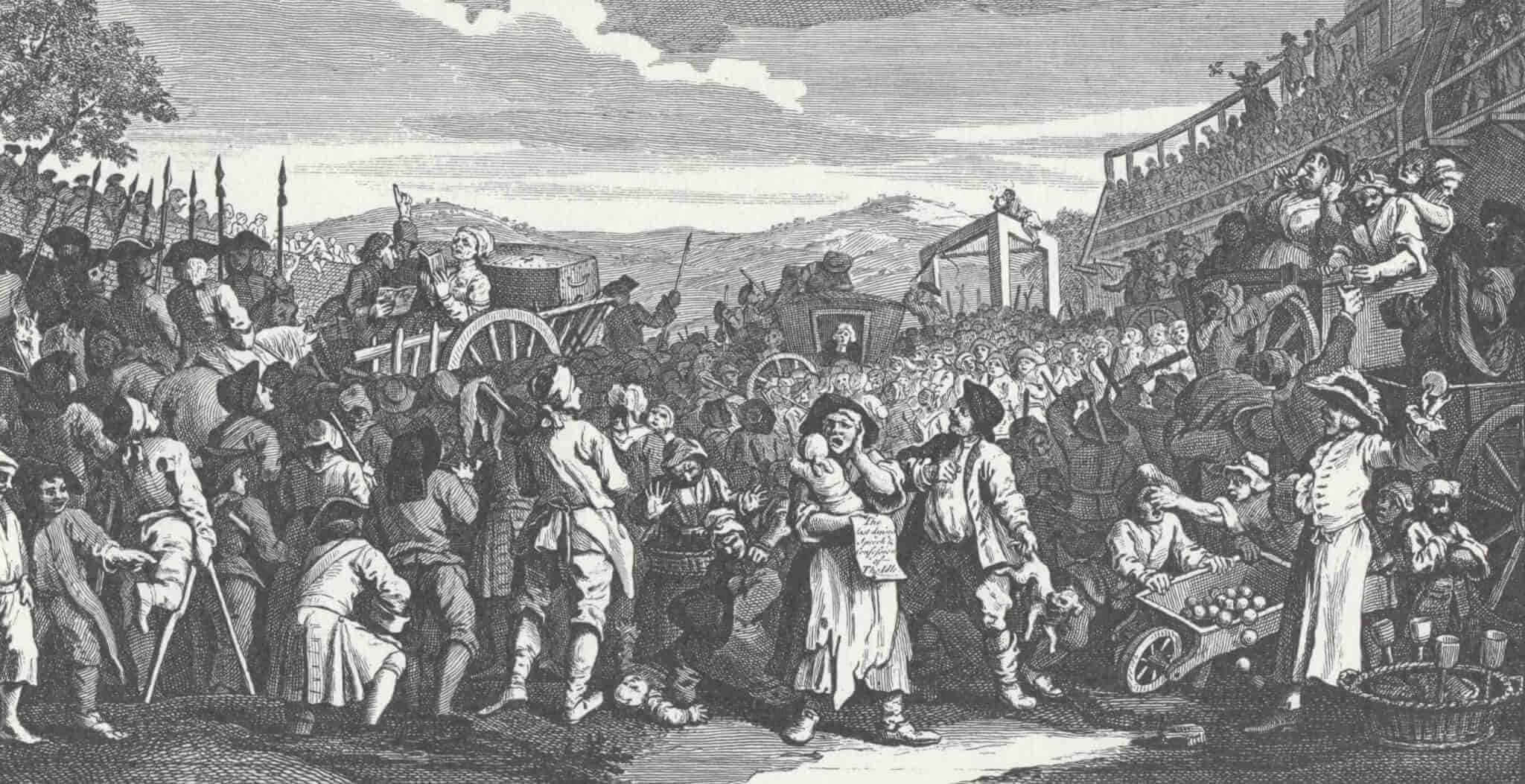

Ei kommentteja:
Lähetä kommentti